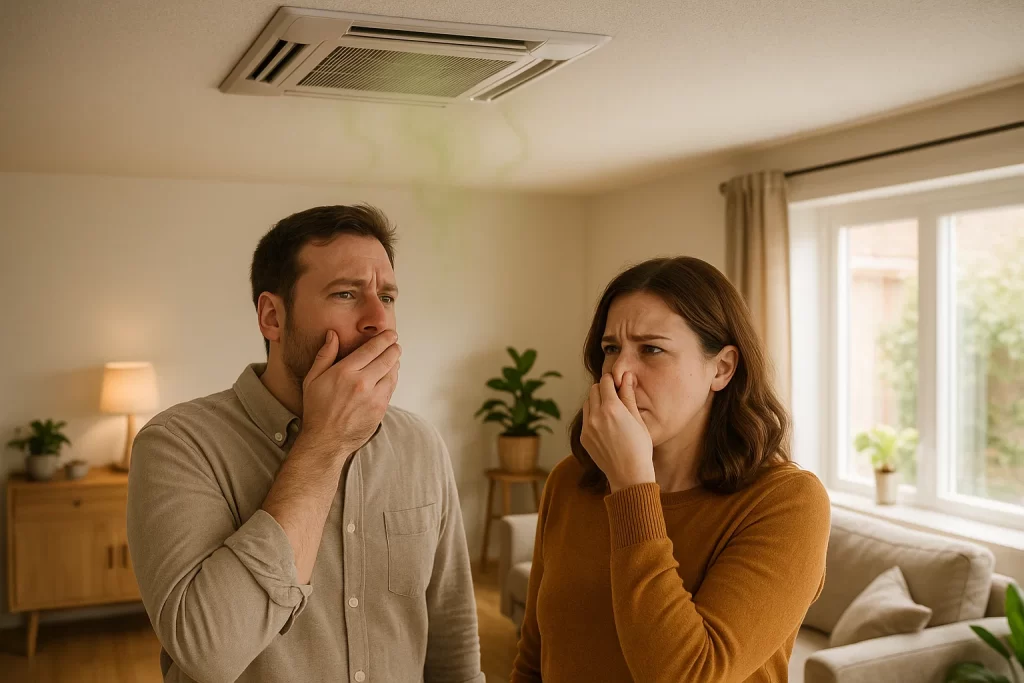Have you ever turned on your air conditioner and been hit with a musty, moldy smell that reminds you of dirty gym socks? If so, you’re not alone—and you’re likely dealing with something called Dirty Sock Syndrome. At Premier, we’ve helped many homeowners in Forsyth, GA, identify and resolve this unpleasant issue. While it might sound funny, Dirty Sock Syndrome is a real AC repair in Forsyth, GA that shouldn’t be ignored.
Let’s break down what it is, how it happens, and why it’s important to take action.

What Is Dirty Sock Syndrome?
Dirty Sock Syndrome refers to a distinct foul odor that comes from your AC system, especially when it first kicks on. It often smells like mildew, mold, or—you guessed it—dirty socks. This smell usually occurs when your HVAC system switches from heating to cooling or when the AC has been off for a while and is turned back on during a warm day.
This condition is most commonly associated with the evaporator coil inside your indoor air handler. That’s because the evaporator coil is cold and damp during operation, making it the perfect breeding ground for microbial growth like mold, mildew, and bacteria. Over time, these microorganisms build up on the coil and begin to produce the unpleasant smell.
How Does Dirty Sock Syndrome Develop?
There are several factors that contribute to the development of Dirty Sock Syndrome in your AC system:
1. Moisture and Humidity
Forsyth’s humid climate provides the perfect conditions for moisture to accumulate inside your AC system. This constant dampness on the evaporator coil becomes a magnet for microbial growth if not properly drained and cleaned.
2. Poor Air Filtration
If your air filters are dirty or not the right fit for your system, dust and organic particles can easily make their way to the evaporator coil. These particles serve as a food source for mold and bacteria, accelerating growth.
3. Lack of Regular Maintenance
Without routine maintenance, evaporator coils can go uncleaned for years, allowing buildup to reach unhealthy levels. Preventative cleaning and inspection are essential to stopping the problem before it starts.
Why Dirty Sock Syndrome Is a Problem
While the odor is the most obvious symptom, Dirty Sock Syndrome can lead to more than just an unpleasant smell:
- Decreased Indoor Air Quality: Mold and bacteria inside your system can spread through the ductwork and into your home.
- Increased Allergy Symptoms: Those with asthma or allergies may notice heightened symptoms due to airborne contaminants.
- Reduced Efficiency: A dirty coil can’t transfer heat efficiently, making your system work harder and use more energy.
- Potential System Damage: Left untreated, microbial buildup can cause corrosion and reduce the lifespan of your HVAC components.
How Premier Solves Dirty Sock Syndrome
At Premier, we offer professional HVAC services in Forsyth, GA, designed to tackle issues like Dirty Sock Syndrome head-on. Our team can:
- Clean and disinfect your evaporator coil with specialized solutions
- Inspect your condensate drain line for proper moisture removal
- Replace or upgrade your air filter system for better particulate capture
- Recommend UV lights or antimicrobial coatings for long-term protection
In severe cases, we may also suggest replacing the evaporator coil with a newer, more resistant model to prevent the issue from recurring.

